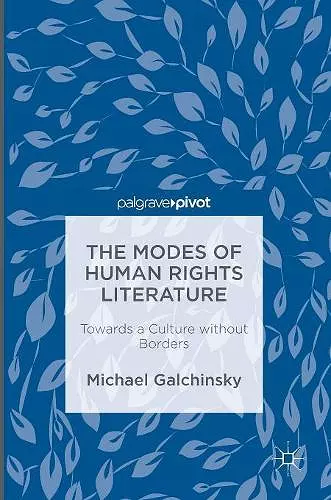The Modes of Human Rights Literature
Towards a Culture without Borders
Format:Hardback
Publisher:Springer International Publishing AG
Published:25th Aug '16
Should be back in stock very soon
This hardback is available in another edition too:
- Paperback£44.99(9783319811376)

"Galchinsky combines the lawyer's flair for categories with the literary critic's sensitivity to textual complexity. The result is an extraordinary work, reaching across centuries and continents, offering us new yet historically grounded frames for reading novels, poetry, and life-writing. Erudite yet admirably clear and accessible, this is a book I will return to again and again in my own research and teaching about post-conflict cultures." (Zoe Norridge, Senior Lecturer in English and Comparative Literature, King's College London, UK) "Galchinsky's book provides a novel account of the role of literature in the struggle for recognition and advancement of human rights. Theoretically well informed, yet accessible and engaging in style, the book is a sophisticated and original contribution to the current, broadly leftist discourse of human rights." (Peter Goodrich, Professor of Law and Director, Program in Law and Humanities, Cardozo School of Law, USA) "Galchinsky examines how laughter and lament might provide an affective grounding for a larger culture of human rights. Reading across divides of literary form and geopolitical context through an approach of 'affective formalism,' he highlights the extra-judicial contributions of cultural production to a shared, global civil society." (Alexandra Schultheis Moore, Associate Professor of English, University of North Carolina, USA)
This sophisticated book argues that human rights literature both helps the persecuted to cope with their trauma and serves as the foundation for a cosmopolitan ethos of universal civility—a culture without borders.
This sophisticated book argues that human rights literature both helps the persecuted to cope with their trauma and serves as the foundation for a cosmopolitan ethos of universal civility—a culture without borders. Michael Galchinsky maintains that, no matter how many treaties there are, a rights-respecting world will not truly exist until people everywhere can imagine it. The Modes of Human Rights Literature describes four major forms of human rights literature: protest, testimony, lament, and laughter to reveal how such works give common symbolic forms to widely held sociopolitical emotions.
“The Modes of Human Rights Literature is an ideal text for students of human rights exploring the ways in which literature and the arts both reflect and refract the quest for human rights. For scholars, it provides a compelling synthesis of commentaries on how culture informs universal human values, engenders empathy, and encourages and enables concern for ‘others’ who are different, distant, or otherwise outside our sphere of immediate personal concern.” (Noam Schimmel, Human Rights Review, Vol. 19, 2018)
ISBN: 9783319318509
Dimensions: unknown
Weight: unknown
132 pages
1st ed. 2016